|
|
 |

Dave Gahan: We Feel Him
Depeche Mode's main man explains the angel songs and devil songs of his first solo disc.
by Jim Macnie & C. Bottomley
Mon. June 02.2003 10:34 AM EDT
Dave Gahan offers one of rock's great cautionary stories. As the charismatic voice of Depeche Mode, he brought the band from London suburbs to American stadiums. Along the way, he went from a clean-cut youth to a ravaged Christ figure, who postured memorably in the Anton Corbijn-directed video for “I Feel You.” But being an electro godhead had its price. In his effort to transform himself into the Last Great Rock Star, Gahan became addicted to heroin.
It happened in 1995, just as Depeche Mode was enjoying its greatest success. Gahan moved to Los Angeles and checked into his personal version of the Hotel California. Guns, slit wrists, and padded cells entered his life. The following year he overdosed on a cocktail of smack and coke; paramedics had to revive him three times. The singer literally died and was reborn.
These days, Gahan's priorities have changed. When he's jogging through Central Park, he prefers to warm up with a little Sigur Ros before tapping into the Led Zeppelin. He's looking for a balance between being a family man with a new daughter and being a pop star with new music to make. He’s moved out of Los Angeles' smog-filled canyons, preferring New York’s concrete jungle. And he’s the stronger for all of it. His voice has sharpened its emotional attack, bringing a deep sense of vulnerability to Depeche Mode’s Ultra and Exciter albums. It's power hasn't dissipated either. It still contains enough sensual majesty to whip up a crowded stadium.
This maturity resonates on Gahan's new solo album, Paper Monsters. No, Depeche Mode isn’t over, but its singer is shaking things up a bit by breaking from his established character as conduit for Martin Gore’s faith and devotion tunes. His days of debauchery still haunt him a bit; Gahan messes with that now-dead persona on lead single "Dirty Sticky Floors." But the man has come around. Amid the disc's bluesy electronics and reflective atmospherics, he actually finds a little hope of his own. He spoke to VH1 about talking to tin men, his New York state of mind, and how "evil Dave" hasn’t completely gone away.
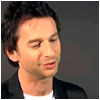 VH1: The “Dirty Sticky Floors” video has a great scene of you trying to push an oversized boat into the water and getting nowhere...
VH1: The “Dirty Sticky Floors” video has a great scene of you trying to push an oversized boat into the water and getting nowhere...
Dave Gahan: It was a real bugger trying to get it into the water! You couldn’t move the thing. I actually pulled my back out later that night. It wasn’t until the next morning that I was like, “What happened? What did I do?”
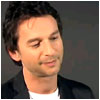 VH1: Is it representative of you trying to get to a certain place in your life but being unable to?
VH1: Is it representative of you trying to get to a certain place in your life but being unable to?
DG: Yeah, and trying to drag it all with you. The song is all about the so-called glamorous side of rock n’ roll, and ending up on some dirty sticky floor every single night, some god-awful toilet in some club or - most of the time - my own dirty sticky floor in my own bathroom. But I wanted to poke fun at the whole side of rock n’ roll and have fun with it, even though the lyrics represent a true part of my life at that time. The tin man and the lion character were two huge dolls I had in my apartment in Santa Monica. I had burnt out all my friends and these two dolls used to keep me company. On any given night, they would start talking to me. Suffice to say, they didn’t last.
 VH1: What did they give you - good or bad advice?
VH1: What did they give you - good or bad advice?
DG: Don’t even go there! It was a really bad time in my life. Too much drugs, too much alcohol. It got to the point of complete paranoia and isolation. I wouldn’t wish that upon my worst friend today, but I was lucky enough to have a few friends that I started to listen to. Thank God I am still here and my life couldn’t be better!
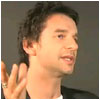 VH1: What’s been the reaction been like to your first solo outing?
VH1: What’s been the reaction been like to your first solo outing?
DG: People are surprised - in a good way! Like, “Oh, it’s good!” I really wanted to make something timeless, and not think so much about who I am or what I'm supposed to do. It wasn’t that I didn’t want to be me. I just wanted to challenge myself and go into the unknown a little.
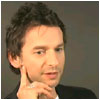 VH1: How did you do that without the security that Depeche Mode must offer?
VH1: How did you do that without the security that Depeche Mode must offer?
DG: I wrote these songs with a friend of mine in New York, Knox Chandler, and it was all about having fun. The only rule that we had while writing was “be open.” We’d be working on one song like ‘’Dirty Sticky Floors’’ one day, and the next, we’d be working on “A Little Piece,” which is a completely different thing. There wasn’t any attempt to make this album fit into a particular genre of music that’s around now.
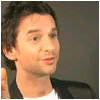 VH1: Did you have more chance to experiment with things than you do with Depeche Mode?
VH1: Did you have more chance to experiment with things than you do with Depeche Mode?
DG: With Depeche, after you’ve been together with people for a long time, you know each other very well and you have your roles. This time, I didn’t want to feel like I had my role – although it’s a great role! I wanted to play a different character for a while and see what that feels like.
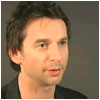 VH1: What’s the story behind the album title?
VH1: What’s the story behind the album title?
DG: I called the album Paper Monsters because while making the album, I realized I was working through some of my biggest fears about things I wasn’t capable of doing. At times it’s like you fake it, until you make it. But the producer, Ken Thomas, put me at ease. He said that the songs had a life of their own. He said, "If the songs make us feel good, they’re going to make other people feel good."
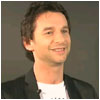 VH1: You’ve spoke about your doubts about playing instruments. You wouldn’t think that of someone who can command a stage like you do. Is that feeling still in your heart?
VH1: You’ve spoke about your doubts about playing instruments. You wouldn’t think that of someone who can command a stage like you do. Is that feeling still in your heart?
DG: Oh yeah. I’m still terrified when I perform! Just before I go onstage, I’m absolutely terrified, but once I’m up there, after a song or two, it’s an amazing place to be. That part of what I do has always been a big strength of mine. When I wrote these songs, we were always thinking about performing them.
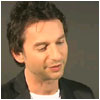 VH1: Some sound like devil songs; some sound like angel songs.
VH1: Some sound like devil songs; some sound like angel songs.
DG: Yeah. A little bit of “evil Dave” comes out in “Bottle Living.” Evil Dave comes out in some of the stuff, but he’s not really that bad. There’s more of my sensitive side in the songs. It had always been there, but I tried to cover it up with the tough guy persona. “Stay” and “A Little Piece” are more reflective of what’s going on in my life, like the birth of my daughter. I embrace life more than I give myself credit. This album is about that – it’s about hope and trying to be in the moment.
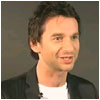 VH1: “Bottle Living” sounds very bluesy. Did you learn about the blues firsthand or through groups like the Rolling Stones?
VH1: “Bottle Living” sounds very bluesy. Did you learn about the blues firsthand or through groups like the Rolling Stones?
DG: The Stones came first. There was also The Doors. But Daniel Miller, who runs Mute Records, said to me, “Look, if you like this, then you’ve got to listen to this!’ So I got introduced to John Lee Hooker, Muddy Waters and Howlin’ Wolf. Muddy Waters blew my head off! He still does. I can play my guitar to it. It’s all 12 bar stuff and you can have a lot of fun. I play my harmonica over Howlin’ Wolf’s stuff. It’s like going backwards for me. It’s great to go back, because you suddenly realize, “Oh, Willie Dixon wrote that Zeppelin song!” For me, it was glam rock first, then it went into electronic stuff like Kraftwerk, and then I got into the blues and could see the genius in what Zeppelin and the Stones did. For me on this album, there’s definitely some glam stuff in there and Ken’s influence – he produced the Sigur Ros’ albums – has definitely given me the space.
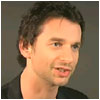 VH1: Sigur Ros has also loomed large over your work of late. Their sound is hard to pin down. Can you describe what their music sounds like?
VH1: Sigur Ros has also loomed large over your work of late. Their sound is hard to pin down. Can you describe what their music sounds like?
DG: You can’t describe it. You can’t say, “Jynsi’s lyrics are … he’s saying this or he’s saying that …” He’s not saying anything! But it makes me feel good. It’s as simple as that. It makes me feel excited about life, wanting to try something myself, wanting to be a better father, wanting to be a better husband. I was playing their second album this morning while I was running. I find it so uplifting. The music of Sigur Ros in the last three years certainly has inspired me again. I’ve had that a lot of times in my life. I could say the same about David Bowie when I was growing up as a teenager. There was something about what he did that was magical and I wanted to escape into that world that he was living in. I wasn’t sure where it was but I was going to try and find out!
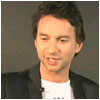 VH1: Isn’t Sigur Ros too dreamy to jog down the street to?
VH1: Isn’t Sigur Ros too dreamy to jog down the street to?
DG: I’ve just turned 41 – although I’m still a very young man – and sometimes it’s just the right thing. I can’t handle listening to Led Zeppelin I straight away! For the first couple of miles it’s Sigur Ros!
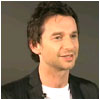 VH1: Tell me about the song “Hidden Houses.”
VH1: Tell me about the song “Hidden Houses.”
DG: Where I live, there are a lot of those doors that lead to nowhere. I walk around a lot on those cobbled streets of New York’s meatpacking district with my son Jimmy and that’s when I first got the idea for the song; that we have all those hidden agendas and secrets that we don’t want to tell, because - God forbid! - someone might get to know us. I wanted to expose that part of me because hiding that stuff can certainly become painful.
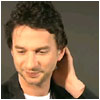 VH1: What’s the appeal of living in New York City for you?
VH1: What’s the appeal of living in New York City for you?
DG: I love living here. I’ve lived here for seven years and a lot more things make sense to me. Miles Davis makes more sense to me. John Coltrane makes more sense to me. I get my best ideas just walking around the city – I can walk around the busiest, noisiest environment, and actually feel peaceful. Everything’s moving around so fast, that I actually slow down. In Los Angeles, I couldn’t do that. Everything was going so slow that the committee in my head wouldn’t stop!
Èñòî÷íèê: VH1.com
Îðèãèíàë ñòàòüè ìîæíî ïðî÷åñòü ÇÄÅÑÜ
|
|
|
|